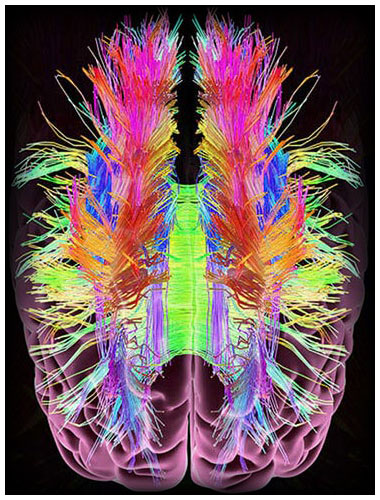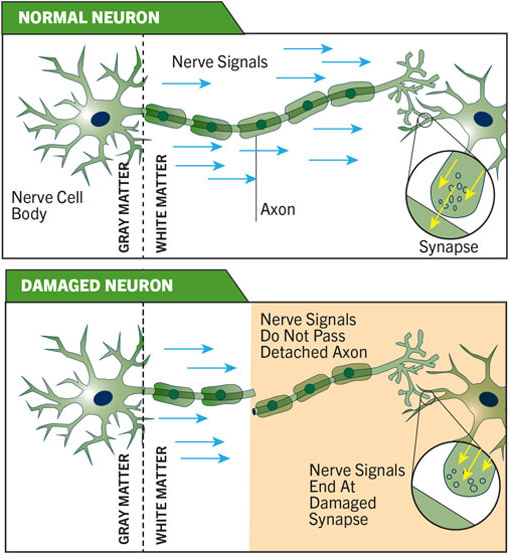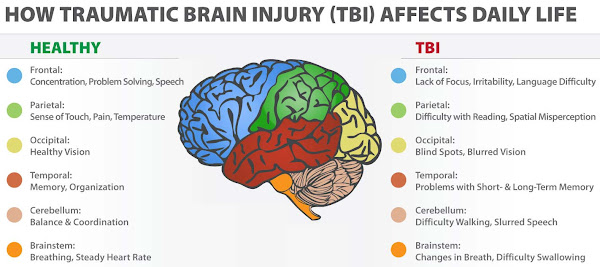WHAT IS A TRAUMATIC BRAIN INJURY (TBI)
A traumatic brain injury, or TBI, is an injury that affects how the brain works. TBI is a major cause of death and disability in the United States. Anyone can experience a TBI, but data suggest that some groups are at greater risk for getting a TBI or having worse health outcomes after the injury.
There were about 61,000 TBI-related deaths in the United States in 2019. That comes to roughly 166 TBI-related deaths every day. TBIs affect the lives of people of all ages. Anyone can experience a TBI, but data suggest that some groups are at greater risk of dying from a TBI or experiencing long-term health problems after the injury.
The majority of 18-wheeler truck wrecks will involve some level of traumatic brain injury. Traumatic brain injuries (“TBI”) occur when a bump, blow, or a jolt to the head disrupts the normal function of the brain.
Surprisingly, a much more common cause is from a rear-end collision. Most of these brain injuries do not involve obvious trauma like a skull fracture or facial wound. The serious whiplash of the head back and forth due to a violent rear-end collision can cause a life altering brain injury (physicians refer to this injury as a “contrecoup” injury (where the brain contacts the front of the skull and back of the skull due to the whiplash forces).
A contrecoup TBI can injure blood vessels in the brain and cause a slow bleed, which can create pressure that contributes to brain damage and even death. Or the bleeds and tears may be microscopic in nature, but nevertheless have serious consequences on the higher (executive level) functioning of the brain. Contrecoup brain injury involves a contusion remote from, and opposite to, the actual site of impact to the head. A Contrecoup brain injury is an injury mainly prevalent in truck accidents given the large force of a rear-end collision from a commercial truck or tractor-trailer.
These injuries cause the neurons (transmitters) of the brain not to be able to relay the electrical messages of the brain as efficiently or quickly—leading to problems with memory, problem solving, emotion control and impulse control. These injuries can have lasting consequences.
TRAUMATIC BRAIN INJURY SYMPTOMS
Traumatic brain injury often occurs as a result of a severe sports injury, car accident, or 18-Wheeler accident. Immediate or delayed symptoms may include confusion, blurry vision, and concentration difficulty. Infants may cry persistently or be irritable.
Unlike other injuries, the full impact of a traumatic brain injury (TBI) may not be fully known at the time of the accident or even at the time of treatment.
Symptoms may appear days or weeks after an initial diagnosis, and could result in additional − and often expensive − medical treatment. Therefore, if you or a loved one has suffered a head injury due to the negligence of another, you should consult with an experienced personal injury attorney right away to ensure all your expenses − both now and in the future − are protected.
- Cognitive: amnesia, inability to speak or understand language, mental confusion, difficulty concentrating, difficulty thinking and understanding, inability to create new memories, or inability to recognize common things
- Behavioral: abnormal laughing and crying, aggression, impulsivity, irritability, lack of restraint, or persistent repetition of words or actions
- Mood: anger, anxiety, apathy, or loneliness
- Whole body: blackout, dizziness, fainting, or fatigue
- Eyes: dilated pupil, raccoon eyes, or unequal pupils
- Gastrointestinal: nausea or vomiting
- Speech: difficulty speaking or slurred speech
- Visual: blurred vision or sensitivity to light
- Also common: persistent headache, a temporary moment of clarity, balance disorder, bleeding, bone fracture, bruising, depression, loss of smell, nerve injury, post-traumatic seizure, ringing in the ears, sensitivity to sound, or stiff muscles
PHYSICAL SIGNS OF TBI DAMAGE
- Headache - Dull or sharp pain within the skull. Can occur anywhere with the cranium including areas away from the point of injury
- Pain around or above the neck - Normally associated with whiplash. The head does not have to be hit for internal damage to occur. The brain tissue is harmed when hitting the inside of a person’s skull
- Bleeding or bruising to any part of the head - Most obvious sign of minor to severe TBI. This includes nose bleeds, cuts or deep bruising to the face, neck or head
- Hearing issues - People can lose hearing in one or both ears, hear ringing or high pitched noises that are not present
- Eyesight problems - Dizziness, Blurred vision, seeing spots or blind spots. People have a hard time focusing or experience changes to vision after knock to head
- Jaw pain - Normally occur from an act of violence or punch. A blow to the jaw can transfer force to skull resulting in damage to brain
- Nausea or Vomiting - Similar to motion sickness or seasickness effect. People feel off balance indicating internal damage to the head
MENTAL SIGNS OF TBI DAMAGE
- Confusion - People are easily confused or disoriented. They can’t remember basic information
- Changes in mood - Agitation and combativeness levels are higher
- Mental Status - Days and weeks after an incident a person’s normal behavioral patterns change. Become more aggressive, depressed or anxious
- Sensitivity to light & sound - Normal sounds and well-lit rooms cause irritation, headache or pain. Suffers of TBI will prefer dark quite rooms
TYPES OF BRAIN INJURIES
When a doctor's mistake (Medical Malpractice) or simple inattention allows a treatable medical condition to result in permanent brain damage, the Traumatic Brain Injury Attorneys at Miller Weisbrod, Attorneys At Law are here to fight for full financial recovery for the victims and their families. Based in Dallas, we serve clients throughout Texas and nationwide.
Head injuries are categorized in three types - Mild, Moderate and Severe. These can have multiple symptoms in common.
- Concussion resulting in changes to your mental status
- Loss of consciousness from 0 to a maximum of 30 minutes
- Confusion, dizziness, fatigue, memory loss, mood changes and headaches
- Medical exams and tests (MRI & CAT Scans) may not show damage
Moderate Brain Injury
- Concussions and Mild symptoms will be present. These issues will last longer and get worse overtime
- Loss of consciousness from 15 minutes to 5 hours
- Same symptoms of mild injury but worse
- Medical exams and brain scans will be used reveal brain tissue damage
Severe Brain Injury
- Loss of consciousness for more than 5 hours
- Obvious swelling of head
- Results in permanent neuro-biological damage
- Results in a permanent lessening of cognitive abilities and sensory functions
- Medical exams MRIs & CAT scans will necessary to assess extent of and area of damage
TRAUMATIC BRAIN INJURY TREATMENTS
Treatments for TBIs depend on the severity of symptoms. Treatment may involve rest, medication, or surgery.
MEDICATIONS
Medications include diuretics that help eliminate extra water from the body. It's also prescribed to treat high blood pressure.
SURGERY
Depending on the severity of the injury, a decompressive craniectomy may need to be performed. This is the surgical removal of part of the skull so that an injured brain can swell without being squeezed.
THERAPY
Rehabilitation is the retraining the brain's pathways to improve mental and physical functioning after an illness or injury.
Cognitive behavioral therapy is a talk therapy focused on modifying negative thoughts, behaviors, and emotional responses associated with psychological distress.
Anger management therapy includes practicing mindfulness, coping mechanisms, and trigger avoidance to minimize destructive emotional outbursts.
Counseling psychology is a branch of psychology that treats personal problems related to school, work, family, and social life.
If you notice any of these symptoms, or if you just can’t think clearly after a car accident, then seek medical attention immediately. You should also consult a personal-injury attorney as soon as possible.
CONTACT MILLER WEISBROD
Miller Weisbrod has dozens of million and multimillion dollar verdicts and settlements on behalf of clients who have suffered all levels of TBI. Our demonstrated trial experience and proven record of results are just some of the many reasons clients continue to turn to us in their time of need.
Among other notable cases, Miller Weisbrod recovered $4,250,000 on behalf of a passenger in a truck who suffered a catastrophic brain injury as a result of being forcibly ejected from a truck in a serious motor vehicle accident as well as $1,500,000 for a client injured in a construction/worksite accident after falling from an unstable work platform.
To schedule a free case evaluation regarding your Traumatic Brain Injury (TBI), please contact our office in Dallas at 214.987.0005 or toll free at 888.987.0005. You may also contact us by filling out the form on this page for answers to your questions or to schedule an appointment.












0 comments:
Post a Comment
Note: Only a member of this blog may post a comment.